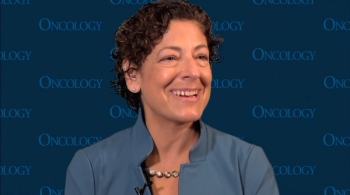
Angela DeMichele, MD, MSCE, discussed the results of the phase 2 I-SPY2 trial in patients with early breast cancer

Your AI-Trained Oncology Knowledge Connection!


Angela DeMichele, MD, MSCE, discussed the results of the phase 2 I-SPY2 trial in patients with early breast cancer

Patients undergoing complex oncologic surgery for head and neck cancer appeared to have shorter hospital stays when using a multiprofessional assessment and information day compared with those who did not.

Angela DeMichele, MD, MSCE, discussed how the phase 2 I-SPY2 trial in patients with early breast cancer is informing patient therapy decisions in difficult-to-treat situations.

A panel of experts review real-world clinical scenarios to highlight recent advances in the management of multiple myeloma.
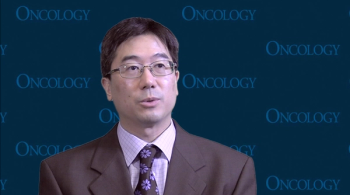
Phillip H. Kuo, MD, PhD, spoke about the future of theragnostic imaging in patients with metastatic castration-resistant prostate cancer.

Patients with locally advanced or metastatic biliary tract cancer can now receive treatment with durvalumab plus gemcitabine following the combination’s approval by the FDA.

Results from a phase 3 trial show similar results in regard to overall survival when patients with advanced pancreatic ductal adenocarcinoma were treated with either folinic acid, fluorouracil, irinotecan, oxaliplatin or gemcitabine/nab-paclitaxel in the first line.

Findings from a study revealed a notable reduction in the risk of prostate cancer–specific mortality in Black United States veterans who underwent prostate-specific antigen screening, highlighting the potential importance of undergoing annual screenings in this patient population.

Blood circulating soluble proteins may be an effective and accessible biomarker for predicting response to immunotherapy among patients with squamous cell lung cancer.
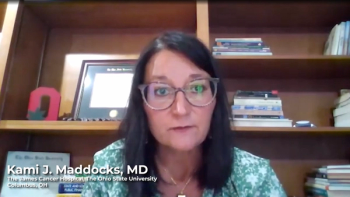
Kami J. Maddocks, MD, talks CAR T-cell therapy approvals for the treatment of relapsed/refractory diffuse large B-cell lymphoma and follicular lymphoma plus a new treatment supplanting R-CHOP.

Overall survival was significantly improved when elotuzumab was added to pomalidomide and dexamethasone in patients with relapsed/refractory multiple myeloma previously treated with lenalidomide and proteasome inhibitors

The phase 1/2 Neo-PATH trial show promising pathological complete response rates and moderate toxicity in patients with stage III or III ERBB2-positive breast cancer when treated with pertuzumab, atezolizumab, trastuzumab, and docetaxel.

Three months of neoadjuvant chemotherapy may downstage early-stage rectal cancer and thereby reduce the need for total mesorectal excisions (TMEs), resulting in higher rates of organ preservation.

In an interview with CancerNetwork®, E. David Crawford, MD, discussed implications from the recent FDA approval of darolutamide plus docetaxel and androgen deprivation therapy in metastatic hormone-sensitive prostate cancer based on findings from the phase 3 ARASENS trial.

Christine Parseghian, MD, discussed the effects of rechallenging patients with a prior response to EGFR inhibition with panitumumab plus or minus the MEK inhibitor trametinib in RAS/BRAF wildtype, microsatellite stable colorectal cancer.

Patients with previously treated KRAS G12C–mutated non–small cell lung cancer experienced superior survival benefit following treatment with sotorasib compared with docetaxel.

Investigators highlighted that when determining a treatment strategy for patients with early-stage prostate cancer, baseline benign prostate hyperplasia symptoms should be taken into consideration.
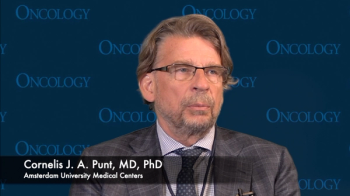
Cornelis J. A. Punt, MD, PhD, spoke about bevacizumab plus either FOLFOXIRI or FOLFOX/FOLFIRI in patients with unresectable colorectal liver metastases and right-sided or RAS/BRAF-mutant tumors and how these regimens may be used for curative-intent therapy.

Results from the phase 3 ICON8 trial showed patients with epithelial ovarian cancer did not experience an overall survival or progression-free survival benefit with weekly dose-dense chemotherapy in the first line compared with 3 times weekly.

Results from a pre-specified interim analysis of the phase 3 KarMMa-3 trial showed the primary end point of progression-free survival was met following treatment with idecabtagene vicleucel for patients with relapsed/refractory multiple myeloma following 2 to 4 previous lines of therapy and who were refractory to their last treatment.

A promising 5-year locoregional recurrence rate highlighted that it is likely safety to de-escalate treatment with locoregional radiotherapy in a population of patients with cT1 to cT2, node-positive breast cancer that has been treated using primary chemotherapy and surgery.

Phillip H. Kuo, MD, PhD, spoke about how prostate-specific membrane antigen PET scan testing affected outcomes in patients with metastatic castration-resistant prostate cancer.

Patients who carry MSH2 and MSH6 variants were more likely to be diagnosed with prostate cancer compared with noncarriers.
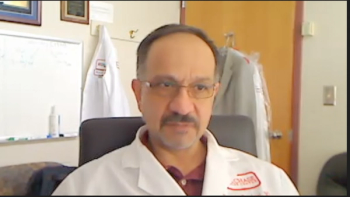

Results from the phase 3 ASCEMBL trial led to the approval of asciminib by the European Commission for patients with Philadelphia chromosome–positive chronic myeloid leukemia in chronic phase.

The FDA has placed a full clinical hold on a phase 1 trial assessing FHD-286 as a potential treatment for patients with relapsed/refractory acute myelogenous leukemia and myelodysplastic syndrome due to concerns around suspected cases of fatal differentiation syndrome that may be associated with the agent.
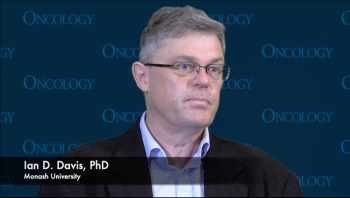
Ian D. Davis, MBBS, PhD, spoke about the TheraP study which evaluated 177Lu-PSMA-617 vs cabazitaxel in patients with metastatic castration-resistant prostate cancer.
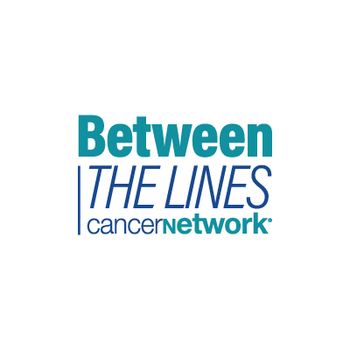
Michael R. Bishop, MD, and Bruce B. Bank, MD, review results from the ELEVATE-RR noninferiority trial on acalabrutinib versus ibrutinib in CLL, and discuss the clinical implications of the findings.

A panel of experts in breast oncology builds a lively discussion on evolving approaches in the management of HER2+ metastatic breast cancer, including key considerations for the treatment of patients with brain metastases.

Shilpa Gupta, MD, and Vinit Makkar, MD, discuss the treatment patterns and disease management of locally advanced/metastatic urothelial carcinoma, with a focus on data from the US physician-based PARADIGM study.